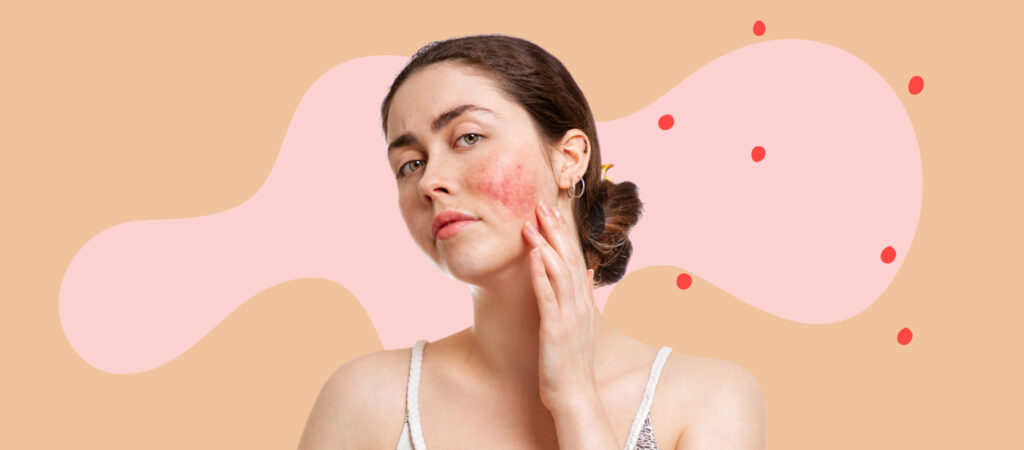Rosacea and Makeup: What You Need to Know

Medically reviewed by Dr. Nancy Shannon, MD, PhD on August 9, 2021
Wearing makeup may seem to pose a dilemma for people who suffer from rosacea — laying on the foundation and concealer may feel necessary for covering up persistent redness or blemishes, but makeup itself can also act as a trigger for rosacea flare-ups.
You can wear makeup while avoiding rosacea flare-ups, but knowing a few things might make it easier.
Careful Application
Before you start to sort through products, make sure you’ve grasped the basics of how to apply makeup if you have rosacea. The key is always to prevent irritation, because irritated skin is at an elevated risk of experiencing a rosacea flare-up.
Nurx offers prescription treatment for acne, anti aging, melasma, rosacea, and eyelash growth.
The first step is to ensure that any skin onto which you’re applying makeup is clean and clear of any substances before you do so. Dirt, oil, dried sweat and dead skin cells are constantly collecting on the face and can act as irritants if left there for too long. Use a gentle cleanser before application in order to wash away any substances that may get trapped under your makeup. Moreover, clean all of your makeup off of your face at the end of that day; even non-irritating products can cause issues if left on for too long.
When applying or removing makeup, take care not to rub or scrub the skin too hard, as this may cause irritation all by itself. Cleanse gently, and use a clean, soft brush during application.
Products to Use
Some makeup products will state on the label that they’ve been tested and cleared for use by people with rosacea. While these products are ideal, you don’t need to limit yourself to them.
If you’d like to use a product that doesn’t have any kind of advisory on the label, feel free to conduct a test of your own. Some dermatologists recommend dabbing a small amount of product on a patch of skin behind the ear and leaving it there for 24 hours. That area of skin is approximately as sensitive as the skin on your face, so if the makeup causes a reaction there, it’s likely to cause a reaction elsewhere as well — if it doesn’t, you’re good to go.
Some types of makeup may be especially good for people with rosacea:
- Mineral-based makeup
Makeups based on mineral ingredients may be less irritating than other types of make-up. Mineral powders can also function as an effective color balance on the top layer.
- Green-tinted primer
Green-tinted makeup can be a good counterbalance to the redness caused by rosacea. This is due to green and red being complementary colors on the color wheel. Applying a green-tinted primer before applying foundation will help disguise any flare-ups or flushing.
Makeup with SPF
Opt for foundations or primers that also act as sunscreens, as sun protection is extra-important for people with rosacea. Look for sunscreen with SPF 30+. If your make-up does not contain sunscreen, you can apply a free-standing sunscreen to your face before applying makeup.
Products to Avoid
While everyone’s skin is different, there are some products that people who experience rosacea should generally be wary of, including:
- Alcohol-Based Products
In a survey conducted by the National Rosacea Society, 66% of people with rosacea reported that alcohol can trigger flare-ups when it comes in contact with their skin. Alcohol-based makeup removers or alcohol-activated makeup should both be considered no-go zones for those with rosacea. Thankfully, the few alcohol-containing makeup products there are can usually be replaced with equally effective non-irritating products.
- Fragrant Makeup
In the same survey mentioned above, 30% of rosacea patients found that fragrances can also act as triggers for their condition — this includes so-called “natural” fragrances.
- Blush
As long as it’s mineral-based or non-irritating, there’s nothing strictly wrong with using blush, but it is important to remember that it can emphasize some of the redness you may experience during a rosacea flare-up. The same goes for lipstick: opt for neutral shades close to your natural skin color in order to avoid accentuating whatever redness appears on your face.
Rosacea can be a tricky variable to deal with when it comes to taking care of your skin, and we’re here to help with that. Get in contact with a member of our team today to learn more about which rosacea treatments can make your life easier.



